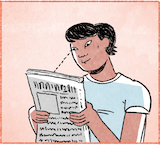

อันนี้คืออี่หยัง อันนี้กะเป็นหนังสือพิมเนาะ
ค้ายๆ กับหนังสือ แต่ว่ามันสิแผ่นน้อยๆ หลือว่าสิมีข้อมูนบ่หลายส่ำหนังสือ
หนังสือพิมนี้มีปะโยดอี่หยังบ่ กะมีอยู่ หนังสือพิมนี้กะสิเฮ็ดออกมาแต่ละมื้อๆ อยู่ในหนังสือพิมนั้นกะสิมีเนื้อหาสาละหลายสิ่งหลายอย่าง อาดสิมีเกี่ยวกับ ข่าวกานเมือง หลือว่าข่าวในสิ่งต่างๆ หลือว่าเกี่ยวกับสาละคะดี หลือว่าละคอนเนาะ กะสิพิมเข้าไปในหนังสือพิมนั้น
ขั้นพุใดอยากอ่านหลือว่าอยากฮู้ข่าวอี่หยังต่างๆ เกี่ยวกับบ้านเมียงกะสามาดไปซื้อหนังสือพิมอยู่ตะหลาดหลือว่าอยู่ล้านขายของ เพื่อที่สิมาอ่านหนังสือพิมนี้
10
เขากำลังเฮ็ดหญัง กะมีพุซายพุหนึ่ง เขากำลังอ่านหนังสือพิมอยู่
ตาของเขากำลังจ้อง กำลังแนมหนังสือพิมอยู่ เขาคือสิกำลังอ่านหนังสือพิมอยู่
แล้วเขาอ่านหนังสือพิม เขาอ่านอี่หยังอยู่ตอนนั้น กะจักคือกัน อันนี้กะบ่ฮู้ว่าเขาอ่านอี่หยังอยู่ อาดสิอ่านข่าว หลือว่าอ่านละคอน หลือว่าเบิ่งอี่หยังต่างๆ ที่อยู่ในหนังสือพิมนั้นกะได้ อันนี้เฮากะบ่ฮู้คือกันเนาะ
Link to overview page
Link to dictionary
| Isaan | Pronunciation | Tones | Thai | English/Notes |
|---|---|---|---|---|
| อัน | an | M | อัน | 1. thing, object 2. general clf. for objects |
| นี้ | ni: | HF | นี้ | 1. this 2. here |
| คือ | khʉ: | HR | คือ | 1. to be, to resemble, like, as 2. why {บักหล้าคือบ่เก็บโต่ะแน่ = [addressing a young boy] Why haven't you cleared the table?} |
| อี่หยัง | i:-yaŋ | H-M | อะไร | 1. what {นี้คืออี่หยัง = What is this?} {มื้อนี้เจ้าเฮ็ดอี่หยัง = What are you doing today?} {กินเข้างายกับอี่หยัง = What did you have for breakfast?} 2. something, anything, (in negations) nothing {บ่ต้องเฮ็ดอี่หยังอีกเลยนอกจากใส่ปุย = [we] don't need to do anything besides adding fertilizer} |
| กะ | ga | M | ก็ | 1. then, consequently 2. also |
| เป็น | pen | M | เป็น | 1. to be, to exist 2. to be able to 3. to suffer, sth. happens to 4. เป็นหญัง[...]คือ in initial position: why? {เป็นหญังเขากะคือแปงฟัน = Why is he brushing his teeth?} {เป็นหญังเคี่ยงบินมันคือสิตก = Why is the airplane falling down?} |
| หนังสือพิม | naŋ-sʉ:-phim | M-M-HR | หนังสือพิมพ์ | newspaper |
| เนาะ | nɔ | H | เนาะ | final particle: makes the statement softer, looking for agreement |
| ค้าย | kha:i | HF | คล้าย | to resemble, to be similar, to be alike {ทัพพีเป็นค้ายๆ กับซ้อน = a ladle is similar to a spoon} |
| กับ | gap | M | กับ | 1. and {ลุงกับป้า = uncle and aunt} {กวยเตียวหมูกับกวยเตียวไก่ = noodle soup with pork and noodle soup with chicken} 2. with, to {ค้ายๆ กับคำว่า ... = similar to the word ...} 3. prefix in front of foods {กับเข้า = side dishes eaten with rice} {เขากินกับกวยเตียว = he's eating noodle soup} |
| หนังสือ | naŋ-sʉ: | M-M | หนังสือ | 1. book {เลียนหนังสือ = to study} 2. text {เขียนหนังสือ = to write sth.} Notes: sentence-final: often with rising tone which is likely a Thai influence |
| แต่ว่า | tɛ:-wa: | H-H | แต่ว่า | 1. but 2. only {ฮู้แต่ว่าเขายืนอยู่พุเดียว = I only know that he's standing there by himself} |
| มัน | man | HR | มัน | it (also used to refer to people) |
| สิ | si | M | จะ | future tense auxiliary {เขากำลังสิตื่น = he's about to wake up} {สิไปตะหลาด = [I'm] going to the market} |
| แผ่น | phɛn | H | แผ่น | clf. for pieces/pages of paper {สะหมุดมีหลายแผ่นบ่ = Does the notebook have many pages?} {กะดาดแผ่นนี้ = this piece of paper} |
| น้อย | nɔ:i | HF | น้อย | 1. few, little 2. small |
| หลือ | lʉ: | M | หรือ | or |
| ว่า | wa: | H | ว่า | 1. that, as {คำว่า X = the word X} 2. to say |
| มี | mi: | HR | มี | 1. to have 2. there is |
| ข้อมูน | khɔ:-mu:n | LF-HR | ข้อมูล | information, data |
| บ่ | bɔ: | H | ไม่ | 1. no, not 2. question particle, transforming a statement into a question Notes: spelling exception in line with common usage on social media |
| หลาย | la:i | M | เยอะ, มาก | many, much, very |
| ส่ำ | sam | H | 1. what size?, what shape? {พุหญิงคนนี้ผมญาวส่ำใด = How long is this woman's hair?} 2. equal to (in size), as large as {โตบักใหญ่หนึ่ง โตส่ำกะทะเอาโลด = a large [fish], filling the whole pan} {อายุส่ำกัน = to be of the same age} {[หนังสือพิม]สิมีข้อมูนบ่หลายส่ำหนังสือ = [a newspaper] doesn't have as much information as a book} |
|
| ปะโยด | pa-yo:t | M-LF | ประโยชน์ | 1. benefit 2. useful |
| อยู่ | yu: | H | อยู่ | 1. to be (located) at 2. yet, still 3. auxiliary indicating continuous or progressive action {ทอดปาอยู่ในกะทะ = (in the process of) frying a fish in the pan} {แม่กำลังเมี้ยนเฮียนอยู่ = mother is cleaning/tidying up the house} |
| เฮ็ด | het | H | ทำ | to do, to make |
| ออก | ɔ:k | LF | ออก | 1. to go out, to leave 2. out |
| มา | ma: | HR | มา | 1. to come 2. auxiliary expressing action towards the present or focal time {กะคุเฮ็ดมาจากอี่หยัง = What is the bucket made of?} {แล้วเขากะเก็บเงินจากพุนั้นมา = and then she takes the money of that person} |
| แต่ละ | tɛ:-la | H-H | แต่ละ | each {มือแต่ละข้างกะสิมีห้านิ้ว = each hand has five fingers} {แต่ละมื้อๆ = each day} |
| มื้อ | mʉ: | HF | วัน | day |
| ใน | nai | HR | ใน | in, within |
| นั้น | nan | HF | นั้น | that, there |
| เนื้อหา | nʉ:a-ha: | HF-M | เนื้อหา | content |
| สาละ | sa:-la | M-H | สาระ | substance, content |
| หลายสิ่งหลายอย่าง | la:i-siŋ-la:i-ya:ŋ | M-H-M-H | หลากหลาย, มากมาย, หลายอย่าง | varied, various, several (kinds etc.) |
| อาด | a:t | LF | อาจ | 1. might, may, will 2. likely |
| เกี่ยวกับ | gi:ao-gap | H-M | เกี่ยวกับ | about, regarding, pertaining to |
| ข่าว | kha:o | H | ข่าว | news |
| กานเมือง | ga:n-mʉ:aŋ | M-HR | การเมือง | politics |
| สิ่ง | siŋ | H | สิ่ง | thing, object |
| ต่างๆ | ta:ŋ-ta:ŋ | H-H | ต่างๆ | different, various |
| สาละคะดี | sa:-la-ka-di: | M-H-H-M | สารคดี | documentary, non-fiction |
| ละคอน | la-khɔ:n | H-HR | ละคร | play, drama, theater, show, fiction |
| พิม | phim | HR | พิมพ์ | to print |
| เข้า | khao | LF | เข้า | to enter, to go inside, to come/go in/on {เข้าห้องน้ำ = to go to the bathroom} {เข้านอน = to go to bed} {ขี่เลียเข้าไปเกาะ = to take a boat to go on an island} |
| ไป | pai | M | ไป | 1. to go 2. auxiliary indicating action extending into the future |
| ขั้น | khan | LF | เมื่อ | when, if |
| พุใด | phu-dai | H-M | ใคร | 1. who {มีพุใดโทมากะบ่ลู้ = I don't know who has called} {ห้องนอนของพุใด = whose bedroom (is this)? } 2. someone, somebody, anybody, in negative context: nobody {บ่มีพุใดอยู่กับเขาเลย = there's nobody with him} |
| อยาก | ya:k | LF | อยาก | to want, to wish |
| อ่าน | a:n | H | อ่าน | to read |
| ฮู้ | hu: | HF | รู้ | 1. to know 2. to understand Notes: equivalent to ลู้ |
| บ้านเมียง | ba:n-mi:aŋ | HF-HR | บ้านเมือง | country, nation |
| สามาด | sa:-ma:t | M-HF | สามารถ | can, to be able |
| ซื้อ | sʉ: | HF | ซื้อ | to buy |
| ตะหลาด | ta-la:t | M-LF | ตลาด | market |
| ล้านขายของ | la:n-kha:i-khɔ:ŋ | HF-M-M | ร้านขายของ | shop, store |
| เพื่อที่ | phʉ:a-thi: | H-H | เพื่อที่ | in order to, so that Notes: the vowel เอือ is likely to be a Thai loan |
| เขา | khao | M | เขา | personal pronoun: he, she |
| กำลัง | gam-laŋ | M-HR | กำลัง | auxiliary indicating continuous or progressive action |
| หญัง | ɲaŋ | M | อะไร, เป็นหญัง = ทำไม | 1. what {เขากำลังเฮ็ดหญัง = What is he doing?} {ธูปเอาไว้เฮ็ดหญัง = What are incense sticks for?} 2. something, anything, (nothing) 3. เป็นหญัง[...]คือ in initial position: why {เป็นหญังเขาคือใส่บักพิกลงไปในกวยเตียว = Why is he putting chili in [his] noodle soup?} {เป็นหญังหน้าต่างมันคือเปิด = Why is the window open?} {เป็นหญังมันคือมีควนไฟ = Why is there smoke?} |
| พุซาย | phu-sa:i | H-HR | ผู้ชาย | man, male |
| พุ | phu | H | ผู้ | 1. person 2. clf. for people {พุหญิงพุหนึ่ง พุซายพุหนึ่ง = a woman, a man} {ซู่พุซู่คน = everybody} {พุหนึ่งโตจ่อยๆ พุหนึ่งโตบักอ้วนหนึ่ง = one person is slim, the other is fat} Notes: pronunciation: also realized as พู่- |
| หนึ่ง | nʉŋ | H | หนึ่ง | 1. one 2. after adjective: intensifier {บักคักหนึ่ง = very much} {อันบักใหญ่หนึ่ง = very large}, or attenuates the meaning {กะดาดมันแผ่นน้อยๆ หนึ่ง = the piece of paper is [relatively] small} |
| ตา | ta: | M | ตา | eye {เขามีตาสองข้าง = he's got two eyes} {หลับตา = to close one's eyes} |
| ของ | khɔ:ŋ | M | ของ | of, belonging to |
| จ้อง | jɔŋ | HF | จ้อง | to look at, to stare |
| แนม | nɛ:m | HR | มอง | to look, to glance, to stare {เขากำลังยืนแนมก้อนหินอยู่ = he's standing and looking at the stone/rock} {ข้างหนึ่งแนมเห็น อีกข้างหนึ่งแนมบ่เห็น = [we] see one side, [we] can't/don't see the other side} |
| แล้ว | lɛ:o | HF | แล้ว | 1. finished 2. already 3. and then, and next (especially แล้วกะ) 4. auxiliary for past tense |
| ตอน | tɔ:n | M | ตอน | when, period {ตอนสองโมงเซ้า = at 8 o'clock in the morning} {ในตอนกินเข้า = when eating} |
| จัก | jak | M | จัก | 1. answer to a question: [I] don't know, don't know exactly, [I'm] not sure {พุซายคนนี้เขาเถ้าไป่ จัก จักเถ้าหลือบ่เถ้า เบิ่งบ่ค่อยออก = Is this man here already old? I don't know. I can't see clearly whether he's old or not.} {เขาเว้ากันอยู่ใส จักคือกัน = Where are they talking? I don't know either.} 2. exact(ly), what exactly {จักต้มอี่หยังกะบ่ฮู้ = I don't know what (exactly) he is cooking} {บ่ลู้คือกันจักปาอี่หยัง = I don't know either what kind of fish this is} 3. how much/many? {ต้นไม้มีจักต้น = How many trees are there?} {ตอนนี้จักโมงแล้ว = What time is it now?} {มือของเฮานี้สิมีจักนิ้ว = How many fingers do our hands have?} 4. a bit, a little bit {จักหน่อย/จักหน่อยหนึ่ง = a bit, a little bit} |
| คือกัน | khʉ:-gan | HR-M | เหมือนกัน | 1. also, likewise, similarly {ยินดีที่ได้ฮู้จักคือกันคับ = Nice to meet you too!} 2. in negative sentences: either {บ่ลู้คือกัน = I don't know either} {จักคือกัน = I don't know (either)} |
| เบิ่ง | bəŋ | H | ดู | 1. to look at, to see, to watch {เบิ่งโทละทัด = to watch TV} {เบิ่งหนัง = to watch a movie} 2. to guess {เบิ่งซงแล้ว ... = [I] guess / from what it looks like ...} |
| ที่ | thi: | H | ที่ | 1. that, which {คนที่ยืนอยู่ฝั่งขวา = the person which is standing on the right = the person standing on the right} {เว้าคำที่บ่สุพาบ = to speak words which are impolite = to speak impolitely} 2. for ordinal numbers {ที่สาม = third} |
| ได้ | dai | HF | ได้ | 1. can 2. to get, to obtain 3. before verb: indicating past tense 4. บ่ได้ + verb: not |
| เฮา | hao | HR | เรา | 1. personal pronoun: we 2. personal pronoun: I |